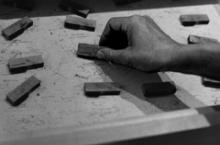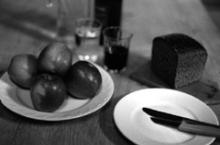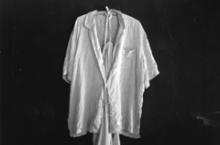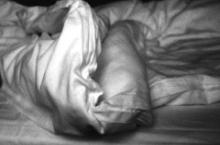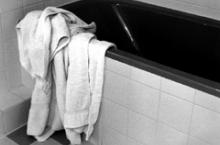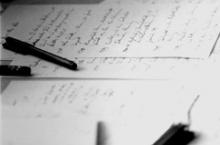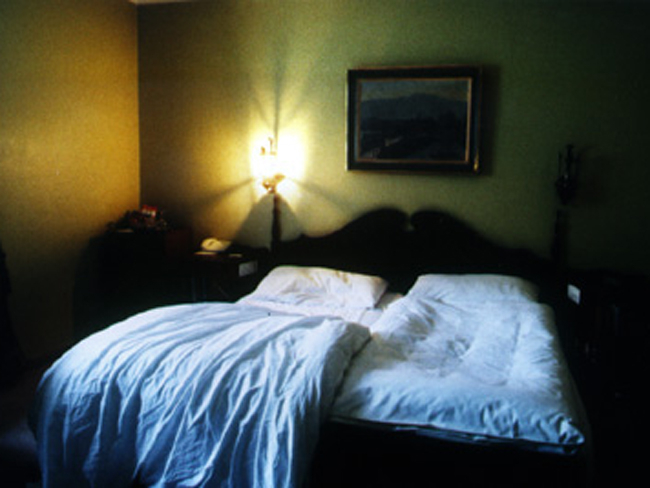
”Barbs“ in a Hotel’s Routine
The situation will no doubt be familiar to anyone who’s ever spent a night in a hotel: one enters the room which, either for a single night or a few days, has now become one’s home away from home; one takes a cursory look at the furniture, peeks into the bath-room, checks the little bottles in the mini-bar, and perhaps glances out the window. After these brief orientation rituals, one turns one’s attention to other tasks: unpacking the suitcase, making a phone call, or simply leaving the room to see the city or attend a meeting. A hotel room and its generally standardized furnishings seldom evoke more profound interest.
But between November 20, 1999 and January 16, 2000, something entirely different will happen at Hotel Franziskaner in Zurich...
(text continues after gallery...)
Minimal changes will be made in six rooms here. Although none of these minor alterations will interfere in any way with the smooth function of the hotel room itself, they will make changes in ordinary, everyday hotel life by transforming the typically anonymous atmosphere within the rooms. In one room, for example, a suit of pajamas will be found lying freshly laundered and wrapped in transparent plastic. Elsewhere, a desk’s drawer will hold surprises in the form of rubber stamps and sheets of stationary; the guest is free to experiment with the stamps and compose sentences or pictures which he or she can then either leave there for the next guest or take along as souvenirs. The mini-bar in a double room will also contain some surprises: instead of the usual snacks and drinks, this little fridge will be full of apples, bread, wine and water which the guests are invited to eat and drink free of charge. In other rooms, the towels, bed sheets and stationary will be inscribed with mysterious poetic phrases that call attention to these typically overlooked utilitarian items.
Each of these alterations is also an invitation. The guest is welcome to wear the pajamas, consume the food in the mini-bar, play with the rubber stamps, or try to discover the relationships between the enigmatic phrases and the ordinary objects upon which they’re written. All of these invitations allow the guest to escape for a moment from the routine of hotel life, to pause and reflect upon the new place where he or she is spending a night or two. When one considers the sum total of these minor alterations, something else becomes clear: all of these interventions revolve around fundamental themes, e. g. sleeping (pyjamas and sheets), eating (mini-bar), washing (towels), or communication (rubber stamps and stationary). These are existential themes that affect all human beings and are essential to our survival. But they’re also themes which seldom occupy our conscious attention because - at least in our affluent Western civilization - most of us simply take them for granted. Travel, among its other effects, can also alter one’s point of view. If one arrives in a strange city and discovers that all of the hotels are full, the seemingly unproblematic issue of shelter can become a serious existential problem. If the traveler knows no one in the foreign city and is unable to speak the local language, a minor linguistic deficit can mutate into an oppressive sense of isolation.
The creator of these little ”barbs“ in the hotel’s routine is a sculptor from Munich named Iris Haeussler, who was invited by Neumarkt Theater to create an artwork in Zurich. It may at first seem surprising to learn that she chose a hotel, of all places, as the site for her project. But Iris Haeussler is an artist who prefers to create her artworks outside the walls of traditional art institutions. For example, on several occasions, she has rented empty apartments and then arranged pieces of furniture and various objects inside them to create the impression that these dwellings are inhabited by fictitious tenants. The illusion is so convincing that an uninitiated visitor is apt to believe that the apartment’s inhabitant actually exists, but is temporarily not at home. The source of this extraordinary verisimilitude might lie in the fact that, because Iris Haeussler’s site-specific artworks so ably manifest her acute sensitivity to preexisting social surroundings, the fictive existences which she creates could very well be possible - or even likely - in the environment which she has chosen. Although in this project at Hotel Franziskaner, Iris Haeussler hasn’t created a fictitious inhabitant, one can nonetheless identify two motifs which are also characteristic of her earlier artworks: first the aforementioned existential theme, which calls one’s attention to basic human needs; and second, the creation of a situation which alludes to potential modes of behavior. These behaviors now no longer relate to a fictitious tenant, but to an actual hotel guest, who is welcome to use - or to ignore - the options which Haeussler’s installation makes potentially available.
Dr. Martina Fuchs
(translated by Howard Fine, Munich)
Room 1
Irgendwann sagt der Kopf, er will nicht mehr gegen die Wand geschlagen werden. Davon fällt nichts raus. Und denken geht anders, vielleicht.
One day, your head will say: stop beating me against the wall. Nothing will come from that. And that's not how thinking works, perhaps.
Room 2
Kein Tier plant über den Winter hinaus.
No animal plans past wintertime.
Room 3
Überlagern sich die Bilder vor und hinter den Augen. Viele vor Deinen Augen läßt Du zurück. Denen, die hinter Deine Augen dringen, gehörst Du.
Images overlap before and behind the eyes. Many of those before you, you reject. Those slipping beyond your eyes, own you.
Room 4
Verspürter als der Flug ist die Vorstellung davon. Sie hat die Augen eines Fliegtieres und das Berührtwerden vom Wind. Und der ist weich.
More genuine than flight itself is your imagination of it. It has avian eyes and the awareness of the wind's caress. It is soft.
Room 5
Ich sehe mich um, im Moment und erschrecke. Als sei Dein Gesicht ein anderes.
I turn around, glancing behind me, startled. As if your face were someone else's.
Room 6
Nicht zu benennendes bleibt zurück.
What cannot be named, remains.

